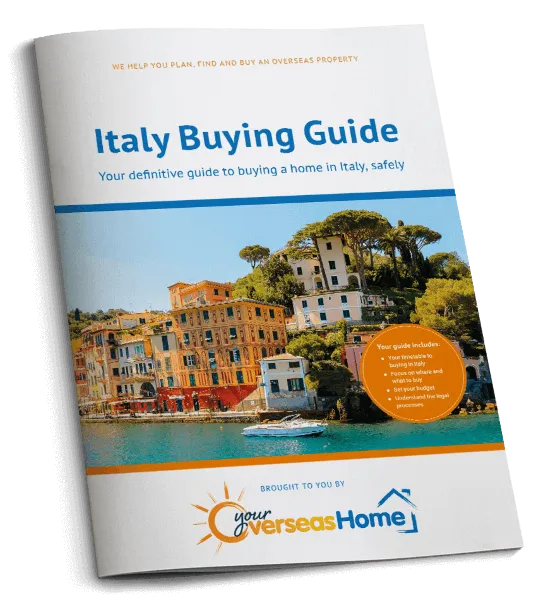Do you plan on renting out your holiday home in Italy? Perhaps you’re looking to rent out part of it? Well, you might be interested to know that a new ruling from the Italian Tourism Ministry has triggered a heated debate between locals, holiday homeowners and the national government.
A short-term lease, in essence, is a lease contract for residential purposes that does not exceed 30 days. The new law came into consideration in the summer of last year following governmental concerns surrounding the number of landlords of short-term rentals (via sites such as Airbnb) who were not paying taxes on their income.

Are you looking into short-term lets in Italy?
According to Reuters, the law could boost Italy’s fiscal revenue by 1 billion euros. The law has been foreshadowed since May 2023 and in December 2023, holiday home rental platform Airbnb paid 576 million euros to the Italian Revenue Agency to settle outstanding income tax obligations for the 2017-2021 tax years.
While the vacation platform paid this amount, it said it was not seeking to recover the sum from its hosts.
In this article, we’ll be speaking to lawyers at c_legal to help you understand the new ruling and manage your property portfolio in Italy effectively.
Find homes in Italy via our property portal.
New rules regarding short-term rentals in Italy
To mitigate this happening again and causing detriment to the Italian economy, the government has made significant changes to the law, as specified in Article 4 of Legislative Decree no. 50/2017, converted with amendments by law no. 96/2017.
We spoke to Manlio Gervasi, attorney at boutique Italian law firm, c_legal, for a breakdown of what’s changed and why. He said,
The bill on short-term rentals aims to regulate the phenomenon of short stays exacerbated by digital sharing platforms such as Airbnb. The crackdown had been foreshadowed since May when there was already talk of an obligation in the historic centres of metropolitan cities to rent properties for at least two nights – an obligation for which no exceptions are allowed.
But there is more to this. The widespread availability of houses and private rooms for rent, especially in art cities, has brought many problems in Italy, as well as in many other countries around the world. It’s not just about containing widespread tax evasion but also about providing guarantees to tourists. For this reason, the National Identification Code has just been introduced, replacing the previous Regional Identification Code (CIR).”
A topline overview of the law changes:
Let’s take a closer look at what’s changed:
- Minimum two nights’ stay
- Mandatory display of the CIN
- Dry Coupon at 26%
- Open VAT position obligation
- Penalties
- Cities involved
We will now take a look at each law change in detail…
To be put in touch with c_legal, simply enquire on Your Overseas Home today.

In certain cities, short-term lets in Italy have a minimum of 2 nights’ stay
Minimum stay of 2 nights
The least contract for tourist purposes of properties with historic, artistic and environmental value or in capital cities, cannot have a duration of less than two consecutive nights.
Furthermore, there is now a limit on apartments under the same owner has been reduced from 4 to 2, which can be taxed nationwide.
CIN codes
Another amendment to the law is the introduction of the National Identification Code (CIN) regarding short-term rentals in Italy. The CIN must be displayed outside the property.
The CIN will be assigned by the Ministry of Tourism and it has been brought in to provide a clear overview of all properties and structures made available for short-term rentals in Italy.
Manlio Gervasi, real estate attorney at c_legal said, “The CIN will be assigned to each residential property subject to rental for tourist purposes upon submission of a specific request by the landlord electronically. The CINs must also contain the indication of the number of available beds as declared in the relevant request and will replace, for all purposes, the regional identification codes (CIR).”
Dry Coupon tax
The “Cedolare Secca” or “Dry Coupon” is a flat tax in Italy that applies to short-term and tourist property rentals. It charges a 21% tax on rental income, but only for people who aren’t professional landlords and are renting out their properties on short-term contracts.
This tax system can’t be used by companies or people who manage rental facilities. Also, you can’t claim any expenses under this system.
From January 2024, the Italian government is changing this tax. Previously, the 21% tax applied to all properties. But now, it will only apply to the first property a person rents out. For any additional properties (from the second to the fourth), the tax rate will be 26%. If a person has more than four properties, they have to register as a business and get a VAT number.
These changes are happening because more people, especially young ones, are finding it hard to afford rent. This is because the rise of short-term rentals has increased prices, making landlords charge more for long-term rentals.
For guidance on the legal aspects of being a landlord, enquire with c_legal today.
Open VAT position
Anyone, directly or through an intermediary, who carries out the rental activity for tourist purposes or short-term rentals, in a business manner (therefore above 4 properties), the absence of such reporting will be punished with a fine ranging from 2,000 to 10,000 euros, depending on the size of the structure or property.
Furthermore, those who rent as a business will have to equip the properties with the legal safety requirements and create systems for the detection of combustible gases and carbon monoxide. In these cases, the violation exposes you to a financial penalty that can range from 600,00 to 6,000.00 euros.

Trulli in Italy – would you be willing to let out your Italian holiday home?
Penalties
Any irregularities will be identified and reported to the local police. Fines for not complying with short-term rental laws in 2024 start at €2,000 – 10,000 for renting out more than four properties without a SCIA and range up to €800 – 8,000 for renting out a property without a CIN.
Cities involved
14 metropolitan cities across Italy are involved. They include Bari, Bologna, Catania, Florence, Genoa, Palermo, Milan, Naples, Palermo, Rome and Venice. Additionally, 969 municipalities with high tourist density are included. For more information, please speak to your lawyer or contact c_legal to discuss your requirements in detail.
You might also like:











